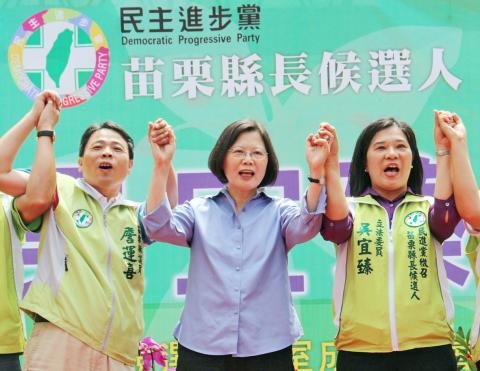Democratic Progressive Party (DPP) Chairperson Tsai Ing-wen (蔡英文) and former chairman Su Tseng-chang (蘇貞昌) yesterday expressed their disapproval of calls to freeze the Taiwanese independence clause in the party’s charter, a day before a party meeting scheduled for a discussion on the proposed freeze.
Tsai said the independence clause has been the party’s objective since its foundation, and it is also the ideal that party members and most Taiwanese have been pursuing.
With Taiwan’s democratization, the “Taiwanese consciousness” has been determinedly formed and these values of identifying with Taiwan and insisting on the nation’s independence and autonomy have already become a “natural ingredient” of the younger generation, Tsai said.

Photo: CNA
“How are we to freeze or abolish this fact or state?” she asked.
Tsai responded to the recent calls to suspend the independence clause yesterday on Google Moderator, a service that helps crowdsource questions and determine which questions interest users the most.
The DPP has been using it as an open platform to engage people on public policy.
She said the reason cited by those who propose mothballing the independence clause has always been the worry that the DPP would not be able to deftly deal with issues concerning cross-strait relations.
“This is a myth,” Tsai said. “People have to ask the question of who really defines the so-called Taiwanese independence framed by the media. Are we not an independent nation? Isn’t consolidating our sovereignty and demanding more substantive participation in the international arena what most Taiwanese are calling for?”
Tsai said the Resolution on Taiwan’s Future (台灣前途決議文) has been the consensus within the party about Taiwan’s sovereignty, future and relationship with China, and it has also become a consensus among the Taiwanese public.
“The DPP, based on this consensus, is aiming for a cross-strait relationship that is more stable and consisting of quality interaction and mutual trust,” she added.
She said that the DPP would be more confident, positive and practical in its attitude and measures, “showing its stability and consistency.”
The party would continue insisting on the principle and position that cross-strait interactions, regardless of form, should not be allowed to damage Taiwan’s democracy, sovereignty or Taiwanese will to determine their own future, Tsai said.
Separately, Su wrote on Facebook yesterday that Taiwan is an independent nation and that its future is in the hands of its 23 million people.
It is the mainstream public opinion, a social consensus of the highest degree and the DPP’s longstanding principle, Su added.
He said that the party’s 2014 China Policy Review: Summary Report (對中政策檢討機要) released in January was the result of scores of conferences with thorough discussions involving more than 600 people that spanned several months. The conclusion has confirmed the fortitude of the DPP’s basic values and core stance.
“The DPP should have confidence in its stance and in Taiwan’s mainstream opinion, clarifying its attitude [whenever needed] to avoid unnecessary misunderstanding from the outside and confusion within the party,” Su wrote.

Taiwan is projected to lose a working-age population of about 6.67 million people in two waves of retirement in the coming years, as the nation confronts accelerating demographic decline and a shortage of younger workers to take their place, the Ministry of the Interior said. Taiwan experienced its largest baby boom between 1958 and 1966, when the population grew by 3.78 million, followed by a second surge of 2.89 million between 1976 and 1982, ministry data showed. In 2023, the first of those baby boom generations — those born in the late 1950s and early 1960s — began to enter retirement, triggering

ECONOMIC BOOST: Should the more than 23 million people eligible for the NT$10,000 handouts spend them the same way as in 2023, GDP could rise 0.5 percent, an official said Universal cash handouts of NT$10,000 (US$330) are to be disbursed late next month at the earliest — including to permanent residents and foreign residents married to Taiwanese — pending legislative approval, the Ministry of Finance said yesterday. The Executive Yuan yesterday approved the Special Act for Strengthening Economic, Social and National Security Resilience in Response to International Circumstances (因應國際情勢強化經濟社會及民生國安韌性特別條例). The NT$550 billion special budget includes NT$236 billion for the cash handouts, plus an additional NT$20 billion set aside as reserve funds, expected to be used to support industries. Handouts might begin one month after the bill is promulgated and would be completed within

NO CHANGE: The TRA makes clear that the US does not consider the status of Taiwan to have been determined by WWII-era documents, a former AIT deputy director said The American Institute in Taiwan’s (AIT) comments that World War-II era documents do not determine Taiwan’s political status accurately conveyed the US’ stance, the US Department of State said. An AIT spokesperson on Saturday said that a Chinese official mischaracterized World War II-era documents as stating that Taiwan was ceded to the China. The remarks from the US’ de facto embassy in Taiwan drew criticism from the Ma Ying-jeou Foundation, whose director said the comments put Taiwan in danger. The Chinese-language United Daily News yesterday reported that a US State Department spokesperson confirmed the AIT’s position. They added that the US would continue to

IMPORTANT BACKER: China seeks to expel US influence from the Indo-Pacific region and supplant Washington as the global leader, MAC Minister Chiu Chui-cheng said China is preparing for war to seize Taiwan, Mainland Affairs Council (MAC) Minister Chiu Chui-cheng (邱垂正) said in Washington on Friday, warning that Taiwan’s fall would trigger a regional “domino effect” endangering US security. In a speech titled “Maintaining the Peaceful and Stable Status Quo Across the Taiwan Strait is in Line with the Shared Interests of Taiwan and the United States,” Chiu said Taiwan’s strategic importance is “closely tied” to US interests. Geopolitically, Taiwan sits in a “core position” in the first island chain — an arc stretching from Japan, through Taiwan and the Philippines, to Borneo, which is shared by